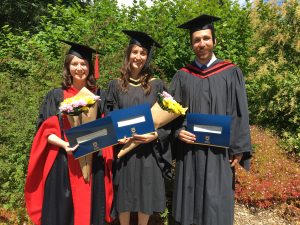 Last April, I graduated with my master’s degree.
Last April, I graduated with my master’s degree.
It was a culmination of far too much time, coffee, stress, journal articles, books, and so many more things. There were really great parts and less great parts, and overall I’m very happy with my grad school experience. I am proud of the work that I did and am happy with my thesis and research.
However, there is one part of the grad school experience that I missed out on: Publishing. And by ‘missed out’, I really mean that it was my fault for not pursuing this aspect of graduate school.
When someone completes their research and distills it into a paper or thesis there is a tremendous amount of work done. Of course, the author/researcher wants people to read their work. They want to contribute the landscape of knowledge in their field.
I–at the time–wanted to get the extra letters beside my name more than I wanted to publish.
Knowing that I could go back and write my thesis into publishable works later gave me an out. I didn’t have to do it right away, and so I didn’t.
However, there was one small hitch. When I did go back to write about the importance of “Organic Moments of Mindfulness in Nature Experiences and Their Importance”, I hit a major roadblock.
All of the articles, papers, case studies, etc. that I had relied on to write my literature review and support my conclusions was suddenly behind a paywall that I didn’t have access to. My credentials through the University of Victoria library were no longer valid because I was no longer a student. All I had was what I had written into my thesis and the few PDF files of articles I had chosen to keep on my computer. I had very little in the way of supporting documents for the paper I wanted to write.
And here is where I get to Open Access.
Pay walls and permissions are limiting the knowledge that is out there. Should only people in academia be able to publish and read research? Should only those with the budget for a variety of journals be able to read new and varied research?
I had something to contribute, and had no way to do so. In our current system, this was my fault. It was my fault for not publishing when I had access. But, why is that our system?
My conclusion is money.
Journals pay their way through these subscription services or single-pay view of articles. I can’t really blame them for wanting to make money. But holding knowledge hostage isn’t right.


Open Access is the idea that research is made freely available online.
Wikipedia is an example of this. While it isn’t peer-reviewed research, it is an openly sourced hub of information. It is widely used and largely reliable [1] source, but can be edited and contributed to by anyone.
PLOS ONE is another example, this time of a peer-reviewed journal, that is Open Access. They publish under the Creative Commons BY (attribution) licence, meaning that anyone can access and use information from PLOS ONE, so long as they attribute the author of the work they reference (Creative Commons licence types).
There are many other examples of Open Access journals and resources.
The result of Open Access is that the world of knowledge that has been hidden behind paywalls and subscription services, etc. can be accessed by anyone who cares to look. This means that no only other researchers can see this body of work, but members of the wider public as well. Because isn’t that what people want? For their hard work to be seen? For their contribution to the world of knowledge to mean something?
Problems exist in this framework, of course. How do journals survive without the income of subscriptions, for example? Can the rigour of peer review be maintained, and the sanctity of well-intentioned, well-practiced, science and inquiry be upheld?
Wikipedia is an example of where the free model can sometimes be difficult to maintain. There are often banners or pop-ups asking for donations to maintain the site.
So, in conclusion, paywalls and subscriptions are hindrances to the availability of knowledge. They prevent outsiders (those who are not current academics) from contributing to the base of knowledge in a traditionally impactful way and they prevent the wider public from accessing the knowledge of others. Open Access may be the answer to that. Open Access removes the barriers to accessing of knowledge from journals, though there are downsides to Open Access as well. While no system is perfect, the availability of knowledge is an important thing for the progression of society and the betterment of everyone.
[1] A study of Wikipedia content quality found that non-featured articles had high-quality content 74% of the time, and featured articles had high-quality content 86% of the time (Javanmardi & Lopes, 2010, http://snap.stanford.edu/soma2010/papers/soma2010_18.pdf)

